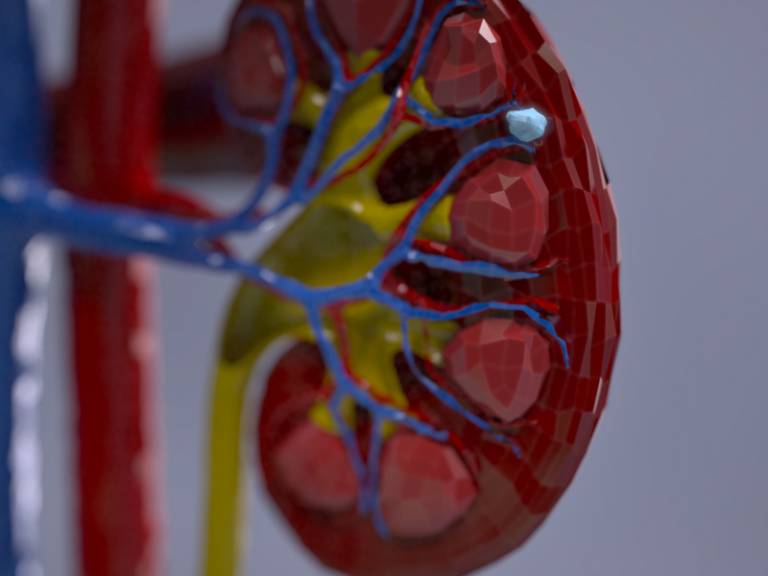'Killer' kidney cancers identified by studying their evolution
12 April 2018
Kidney cancer follows multiple distinct evolutionary paths, finds new research by a team involving UCL.

The research will enable the scientists to detect whether a tumour will be aggressive and reveals that the first seeds of kidney cancer are sown as early as childhood.
The three Cancer Research UK-funded studies, published in the journal Cell, shed light on the fundamental principles of cancer evolution and could lead to future clinical tests to give patients more accurate prognoses and personalised treatment.
"Understanding how cancers develop and evolve over time is likely to be critical in helping us piece together the information that will point the way to new treatment approaches and predicting outcomes," said Professor Charles Swanton (UCL Cancer Institute, Francis Crick Institute and Cancer Research UK), who was a co-lead author on all three papers.
In the first two papers, the TRACERx Renal team*, based at the Francis Crick Institute, UCL, The Royal Marsden NHS Foundation Trust, and Guy's and St Thomas' NHS Foundation Trust, analysed over 1,000 tumour samples from 100 kidney cancer patients in order to reconstruct the sequence of genetic events that led to the cancer in each patient.
The analysis reveals that there are three evolutionarily distinct types of kidney cancer. The first type follows a slow evolutionary path, never acquiring the ability to become aggressive.
The second type, by contrast, forms the most aggressive tumours, which evolve through a rapid burst of genomic damage - including changes that affect large chunks of the genome - early on in the cancer's development. This gives the tumour all it needs to spread to many other parts of the body, often before the primary cancer is diagnosed.
The third tumour type acquires the ability to spread through a gradual accumulation of genomic damage. They typically spread over a longer period of time, often to just one site. These tumours are composed of many different populations of cancer cells, some of which are aggressive.
The researchers were able to confirm their findings by analysing tumour samples obtained after death from patients in the post-mortem tumour sampling study, PEACE**.
"The outcomes of patients diagnosed with kidney cancer vary a great deal - we show for the first time that these differences are rooted in the distinct way that their cancers evolve," said the paper's co-lead author Dr Samra Turajlic (Francis Crick Institute and The Royal Marsden).
"Knowing the next step in cancer's evolutionary trajectory could tailor the treatment choice for individual patients in the next decade. For instance, patients with the least aggressive tumours could be spared surgery and monitored instead, and those with gradually evolving tumours could have the primary tumour surgically removed even after it has spread," she added.
The researchers also analysed the traits that distinguish cells in the primary tumour that lead to secondary tumours, from those that never leave the primary tumour site. The cells that could spread were distinguished by changes at the chromosome level rather than mutations in genes, including two specific chromosome changes which could serve as a useful marker to identify patients that are at risk of metastatic disease.
"We hope that in the future this work will help tailor surgical and medical intervention to the right patients at the right time," said Professor Swanton.
The third paper analysed the earliest events that trigger kidney cancer development. It shows they can take place in childhood or adolescence, up to 50 years before the primary tumour is diagnosed. The results present an opportunity for monitoring and early intervention in the treatment of kidney cancer, particularly in high-risk groups, such as those with an inherited risk of developing the disease.
"We can now say what the initiating genetic changes are in kidney cancer, and when they happen. What is remarkable is that the hallmark genomic event that characterises kidney cancer takes place on average 40 to 50 years before the cancer is diagnosed. These first seeds are sown in childhood or adolescence - knowing the sequence of events and their timings opens opportunities for early intervention." said co-lead author Dr Peter Campbell (Wellcome Sanger Institute, Cambridge).
Links
- Research paper in Cell (evolutionary trajectory)
- Research paper in Cell (evolutionary trajectory)
- Research paper in Cell (early life events)
- Professor Charles Swanton's academic profile
- UCL Cancer Institute
Notes
- *The Tracking Cancer Evolution through therapy (TRACERx) Renal study is a prospective longitudinal study of up to 300 kidney cancer patients tracking how their cancer evolves over time. It is a collaboration between clinicians and researchers at The Royal Marsden and Guy's and St Thomas' NHS Foundation Trust (where the patients were recruited), and the Francis Crick Institute, UCL Cancer Institute and the CRUK PEACE autopsy program at University College London Hospitals (UCLH) NHS Foundation Trust. The team is supported by the NIHR Biomedical Research Centre at UCLH and UCL.
- **The PEACE study, sponsored by UCL, is a prospective longitudinal study of blood samples during a patient's life and tissue samples after they have died to learn more about advanced cancer.
Image and video
- Credit: Phospho Biomedical Animation
Media contact
Chris Lane
Tel: +44 (0)20 7679 9222
Email: chris.lane [at] ucl.ac.uk
 Close
Close

